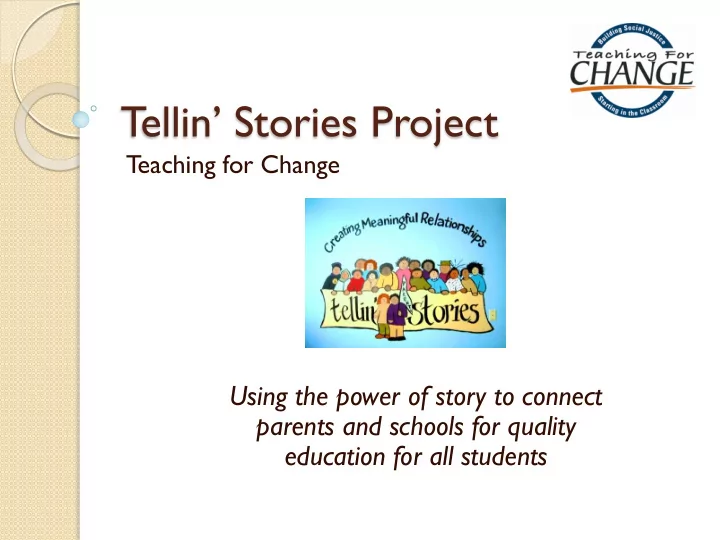

Tellin’ Stories Project Teaching for Change Using the power of story to connect parents and schools for quality education for all students
Tellin’ Stories Project Teaching for Change Allyson Criner Brown Associate Director/Tellin’ Stories Project Manager Deborah Menkart Executive Director
Teaching for Change provides teachers and parents with the tools to create schools where students learn to read, write, and change the world
Listen Up! | T ellin ’ Stories Project Session Objectives Participants will learn approaches from Teaching for Change to: • Help teachers and administrators rethink their assumptions about parent involvement and why traditional approaches are often unsuccessful • Adopt new approaches to parent-school relations so that there is a level playing field
Listen Up! | T ellin ’ Stories Project Agenda • Welcome and Introduction • Ice Breaker • Turning the Tables on Prof. Devel. • Top Family Engagement Strategies • How We Do It – Principles for PD • Closing and Evaluation
Where and with Whom We Work “Tellin’ Stories did not just increase the numbers of parents involved – it literally changed the face of who we saw coming in the door and advocating for their children .” -- Michelle Molitor, principal “They've really helped us learn how to help our kids. We [Spanish-speaking parents] were closed to those activities and opportunities before, but now they are open to us.” -- Imelda Marroquín, parent
Tellin’ Stories School-based approach • Build relationships between families and schools • Address the cultural differences, understand diversity, and develop multicultural relationships • Help parents to develop skills needed to advocate and assist their children in getting a quality education • Prioritize parents’ concerns and develop action plans to enhance their school community • Professional development, coaching, and support for principals, teachers, and parent coordinators
Assumptions TELLIN’ STORIES TRADITIONAL Parents play multiple roles : Parents roles are limited : teachers, supporters, monitors, fundraising, chaperoning, advocates, decision makers and attending PTA meetings. more. Parents need to have specific All parents are resources to their skills to be involved. Many lack children’s schools. Schools must the capacity or willingness recognize and cultivate the to be involved. (deficit-model) knowledge and strength of each Starting point: Hold a PTA family. meeting and have parents sign Starting point: building trust up for committees. through sharing our stories. Diversity is a challenge . Diversity is a strength . School School culture needs to be culture and leadership must reflect imposed on the school the diversity of the school community. community.
Tellin’ Stories Signature Activities • Story Quilting Series • Community Walk • Welcoming Climate Walkthrough • Roving Readers • Grade Level Dialogues • Cross-City Parent Coordinator Training
Listen Up! | T ellin ’ Stories Project Ice Breaker!
Listen Up! | T ellin ’ Stories Project What can happen as a result of effective PD with teachers and family engagement practitioners? • Schools become more aware of the language, culture, and experiences of their families
Listen Up! | T ellin ’ Stories Project What can happen as a result of effective PD with teachers and family engagement practitioners? • Teachers, staff, and administrators approach parents as partners
Listen Up! | T ellin ’ Stories Project What can happen as a result of effective PD with teachers and family engagement practitioners? • School meetings include and engage families in meaningful ways
Listen Up! | T ellin ’ Stories Project What can happen as a result of effective PD with teachers and family engagement practitioners? • Schools appreciate parents and see them as resources
Listen Up! | T ellin ’ Stories Project What can happen as a result of effective PD with teachers and family engagement practitioners? • Parents emerge as leaders and advocates for their children
Listen Up! | T ellin ’ Stories Project What can happen as a result of effective PD with teachers and family engagement practitioners? • Teachers welcome – and request! – parent involvement
Listen Up! | T ellin ’ Stories Project What can happen as a result of effective PD with teachers and family engagement practitioners? • Build relationships that break down barriers and create direct links in the home-school partnership
Listen Up! | T ellin ’ Stories Project Parent Panel Debrief What themes or trends did you notice? How did parents feel about their experiences with the school? How would you describe the parents’ experiences and their relationships with the teachers? What do you think teachers might take away from this conversation? What insight/knowledge/skills do you think teachers need to engage with parents based on what you’ve heard?
Listen Up! | T ellin ’ Stories Project Family Engagement Strategies
Listen Up! | T ellin ’ Stories Project Family Engagement Strategies Positive phone calls home Home visits Including families in the curriculum Parent-teacher academic meetings (Grade Level Dialogues) Parent Centers/ Parent Coordinators
Listen Up! | T ellin ’ Stories Project How We Do It: Principles for PD Encourage community/relationship building Acknowledge power dynamics when parents engage with schools Lead teachers to question and confront their assumptions about families
Listen Up! | T ellin ’ Stories Project How We Do It: Principles for PD Promote shared learning: between teachers, between parents and teachers Tap into what families/teachers already know and are doing Include family voices in PD
Listen Up! | T ellin ’ Stories Project How We Do It: Principles for PD Encourage respectful and responsive family engagement Find ways to be interactive, welcoming, accessible Develop strategies specific to their families
Tellin’ Stories Project Teaching for Change www.TeachingforChange.org
Recommend
More recommend